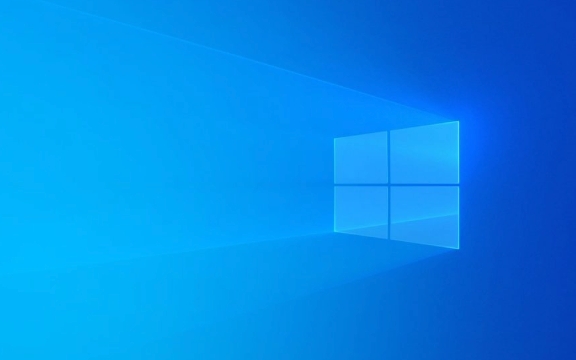Windows automatic repair loop fix
Jul 07, 2025 am 01:31 AMUse the installation media to enter the recovery environment; 2. Run the bootrec command to repair the boot records; 3. Check for disk errors and repair system files; 4. Disable automatic repair as a temporary means. The Windows automatic repair loop is usually caused by system files corruption, hard disk errors or boot configuration abnormalities. The solution includes troubleshooting by installing the USB flash drive into the recovery environment, using bootrec to repair MBR and BCD, running chkdsk and DISM/sfc to repair disk and system files. If it is invalid, the automatic repair function can be temporarily disabled, but the root cause needs to be checked later to ensure that the hard disk and boot structure are normal.

Windows automatically repairs loop problems, which usually happens when the system cannot boot normally. At this time, the "automatic repair" interface will be repeatedly entered. Trying to repair but it will never succeed. This situation is mostly caused by system files, hard disk errors, or abnormal startup configuration data.

If you encounter this problem, the following methods can help you solve it.

1. Use the installation media to enter the recovery environment
If your computer is stuck in the "trying to repair your computer", the most direct way is to install the USB disk or CD through Windows to enter the recovery environment.
- Insert the installation media and restart the computer
- Select Start from USB drive (usually F12, Esc, or Delete keys) in the BIOS or boot menu
- After entering, select the language and keyboard settings and click "Next"
- Click "Repair Computer" > "Troubleshooting" > "Advanced Options"
Here you can execute command prompt, system restore, start repair and other operations.

2. Run the bootrec command to repair the boot record
In the command prompt mentioned above, enter the following command:
-
bootrec /fixmbr -
bootrec /fixboot -
bootrec /rebuildbcd
These three steps are used to repair the main boot record, write the startup sector, and rebuild the BCD (start configuration data). If the hard disk partition is not seriously damaged, it can generally solve the problem.
Note: If the system partition is not found, it may be because there is a problem with the partition table, or there is a physical bad channel on the hard disk.
3. Check for disk errors and repair system files
Sometimes system files are corrupted and can also cause an automatic repair loop. You can try running the following command:
chkdsk /f /r
Check and fix disk errors, the process can take several minutes.DISM /Image:C:\ /Cleanup-Image /RestoreHealth
(Note: C: It is the system disk, modified according to actual conditions)
If DISM completes successfully, run again:sfc /scannow /offbootdir=C:\ /offwindir=C:\Windows
This step will scan the system files and try to repair them.
4. Disable automatic repair as a temporary means
If none of the above methods work, you can try to temporarily turn off the automatic repair function:
Run in the command prompt:
-
bcdedit /set {default} recoveryenabled No -
bcdedit /set bootstatuspolicy ignoreallfailures
This allows the system to skip the automatic repair process and try to start directly. But this is just bypassing the problem and cannot be completely solved. It is recommended that the root cause be fixed in the future.
Basically these common methods. The situation is different for each computer and it may require multiple steps to solve it in combination. When encountering this kind of problem, don’t worry, check it step by step, the key is to confirm that the hard drive is fine and the system boot structure is complete.
The above is the detailed content of Windows automatic repair loop fix. For more information, please follow other related articles on the PHP Chinese website!

Hot AI Tools

Undress AI Tool
Undress images for free

Undresser.AI Undress
AI-powered app for creating realistic nude photos

AI Clothes Remover
Online AI tool for removing clothes from photos.

Clothoff.io
AI clothes remover

Video Face Swap
Swap faces in any video effortlessly with our completely free AI face swap tool!

Hot Article

Hot Tools

Notepad++7.3.1
Easy-to-use and free code editor

SublimeText3 Chinese version
Chinese version, very easy to use

Zend Studio 13.0.1
Powerful PHP integrated development environment

Dreamweaver CS6
Visual web development tools

SublimeText3 Mac version
God-level code editing software (SublimeText3)

Hot Topics
 How Do Generators Work in PHP?
Jul 11, 2025 am 03:12 AM
How Do Generators Work in PHP?
Jul 11, 2025 am 03:12 AM
AgeneratorinPHPisamemory-efficientwaytoiterateoverlargedatasetsbyyieldingvaluesoneatatimeinsteadofreturningthemallatonce.1.Generatorsusetheyieldkeywordtoproducevaluesondemand,reducingmemoryusage.2.Theyareusefulforhandlingbigloops,readinglargefiles,or
 How to prevent session hijacking in PHP?
Jul 11, 2025 am 03:15 AM
How to prevent session hijacking in PHP?
Jul 11, 2025 am 03:15 AM
To prevent session hijacking in PHP, the following measures need to be taken: 1. Use HTTPS to encrypt the transmission and set session.cookie_secure=1 in php.ini; 2. Set the security cookie attributes, including httponly, secure and samesite; 3. Call session_regenerate_id(true) when the user logs in or permissions change to change to change the SessionID; 4. Limit the Session life cycle, reasonably configure gc_maxlifetime and record the user's activity time; 5. Prohibit exposing the SessionID to the URL, and set session.use_only
 How to URL encode a string in PHP with urlencode
Jul 11, 2025 am 03:22 AM
How to URL encode a string in PHP with urlencode
Jul 11, 2025 am 03:22 AM
The urlencode() function is used to encode strings into URL-safe formats, where non-alphanumeric characters (except -, _, and .) are replaced with a percent sign followed by a two-digit hexadecimal number. For example, spaces are converted to signs, exclamation marks are converted to!, and Chinese characters are converted to their UTF-8 encoding form. When using, only the parameter values ??should be encoded, not the entire URL, to avoid damaging the URL structure. For other parts of the URL, such as path segments, the rawurlencode() function should be used, which converts the space to . When processing array parameters, you can use http_build_query() to automatically encode, or manually call urlencode() on each value to ensure safe transfer of data. just
 PHP get the first N characters of a string
Jul 11, 2025 am 03:17 AM
PHP get the first N characters of a string
Jul 11, 2025 am 03:17 AM
You can use substr() or mb_substr() to get the first N characters in PHP. The specific steps are as follows: 1. Use substr($string,0,N) to intercept the first N characters, which is suitable for ASCII characters and is simple and efficient; 2. When processing multi-byte characters (such as Chinese), mb_substr($string,0,N,'UTF-8'), and ensure that mbstring extension is enabled; 3. If the string contains HTML or whitespace characters, you should first use strip_tags() to remove the tags and trim() to clean the spaces, and then intercept them to ensure the results are clean.
 How to access a character in a string by index in PHP
Jul 12, 2025 am 03:15 AM
How to access a character in a string by index in PHP
Jul 12, 2025 am 03:15 AM
In PHP, you can use square brackets or curly braces to obtain string specific index characters, but square brackets are recommended; the index starts from 0, and the access outside the range returns a null value and cannot be assigned a value; mb_substr is required to handle multi-byte characters. For example: $str="hello";echo$str[0]; output h; and Chinese characters such as mb_substr($str,1,1) need to obtain the correct result; in actual applications, the length of the string should be checked before looping, dynamic strings need to be verified for validity, and multilingual projects recommend using multi-byte security functions uniformly.
 PHP get the last N characters of a string
Jul 11, 2025 am 03:17 AM
PHP get the last N characters of a string
Jul 11, 2025 am 03:17 AM
There are two main ways to get the last N characters of a string in PHP: 1. Use the substr() function to intercept through the negative starting position, which is suitable for single-byte characters; 2. Use the mb_substr() function to support multilingual and UTF-8 encoding to avoid truncating non-English characters; 3. Optionally determine whether the string length is sufficient to handle boundary situations; 4. It is not recommended to use strrev() substr() combination method because it is not safe and inefficient for multi-byte characters.
 How to set and get session variables in PHP?
Jul 12, 2025 am 03:10 AM
How to set and get session variables in PHP?
Jul 12, 2025 am 03:10 AM
To set and get session variables in PHP, you must first always call session_start() at the top of the script to start the session. 1. When setting session variables, use $_SESSION hyperglobal array to assign values ??to specific keys, such as $_SESSION['username']='john_doe'; it can store strings, numbers, arrays and even objects, but avoid storing too much data to avoid affecting performance. 2. When obtaining session variables, you need to call session_start() first, and then access the $_SESSION array through the key, such as echo$_SESSION['username']; it is recommended to use isset() to check whether the variable exists to avoid errors
 Java Socket Programming Fundamentals and Examples
Jul 12, 2025 am 02:53 AM
Java Socket Programming Fundamentals and Examples
Jul 12, 2025 am 02:53 AM
JavaSocket programming is the basis of network communication, and data exchange between clients and servers is realized through Socket. 1. Socket in Java is divided into the Socket class used by the client and the ServerSocket class used by the server; 2. When writing a Socket program, you must first start the server listening port, and then initiate the connection by the client; 3. The communication process includes connection establishment, data reading and writing, and stream closure; 4. Precautions include avoiding port conflicts, correctly configuring IP addresses, reasonably closing resources, and supporting multiple clients. Mastering these can realize basic network communication functions.






